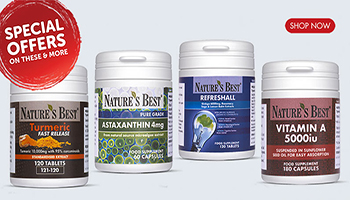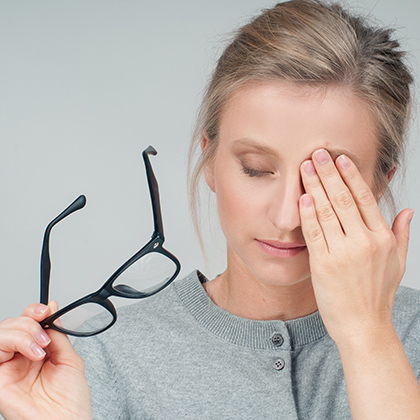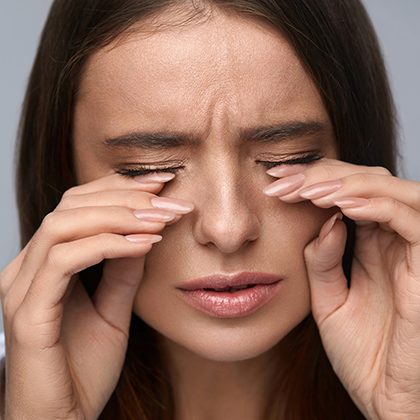
Most people realise water is important for human health. After all, 50 - 65 per cent of an adult’s body is made from water. What many of us forget, however, is that water is an essential ingredient for maintaining the health of our eyes. The eye is made of three chambers — the largest of which is the vitreous chamber. This is filled with a clear, colourless fluid called the vitreous humour, which helps your eye keep its shape and the retina in place. This vitreous humour is made of 99 per cent water, with the rest being a mixture of collagen, proteins, salts and sugars. As such, when we become dehydrated, not only can this have a significant impact on our bodies, but also on our eyes. To help you understand how dehydration affects the eyes a little better, and how to prevent them, we’ve put together this helpful guide.
What is dehydration?
Maintaining a healthy water level in the body is a complex process involving your kidneys and substances in the blood called electrolytes that regulate water balance at a cellular level. Every day you lose an amount of water through things like urine, sweat and exhaling. But when you lose or use more water than you take in, it can leave you dehydrated. During the very early stages of dehydration, you probably won’t experience any symptoms.

However, when you become mildly or moderately dehydrated you may experience a number of symptoms including dry mouth, tiredness, muscle cramps and dizziness. If mild dehydration progresses to severe dehydration, the symptoms can become more serious, including low blood pressure, confusion, loss of consciousness and shock. Meanwhile, if you have prolonged or repeated bouts of dehydration it can lead to urinary tract infections, kidney stones as well as kidney failure.
How does dehydration affect the eyes?
Where your eyes are concerned, being dehydrated – even mildly – can mean you won’t be able to produce enough tears to lubricate them. While crying can produce visible tears, your eyes are constantly producing fluid for your tear film, which helps make sure the transparent front part of the eye – the cornea – stays wet and supplied with oxygen. Each time you blink, your eyelid distributes tear fluid across your cornea. However, when you’re dehydrated and not making enough tears, it can make your eyes feel dry, tired, sore and irritated.
Studies also suggest that dehydration can lead to dry eye syndrome. For instance, in one study published in Investigative Opthalmology & Visual Science, researchers found that those diagnosed with dry eye syndrome had a higher plasma osmolality (level of water in the blood) compared with those who didn’t have dry eye. According to the researchers, their findings indicate that whole-body hydration is an important consideration in dry eye.ii There may be other ways in which dehydration affects vision too. Experts from the Journal of Clinical & Experimental Opthalmology note that owing body hydration status may affect the health of your vision. By reviewing the evidence looking at hydration and major common eye diseases, they found dehydration may be associated with the development of dry eye syndrome, as well as vision problems such as cataracts, refractive changes and retinal vascular disease.iii
How to prevent dry eyes
While dry eye can be irritating and uncomfortable, there are a number of practical steps you can take to prevent dehydration and soothe dry eyes.
Drink more water
Keeping your fluid levels topped up on a regular basis will help prevent dehydration. According to the NHS, around 1.2 litres of fluid a day – that’s about six to eight glasses – is enough to stop you from becoming dehydrated (but you may need more if you’re staying in a hot country). While plain water is the best option, a number of other choices include milk, tea and coffee, sugar-free squash and a limited amount of fruit juice, as it’s naturally high in sugar (the NHS recommends a maximum of 150ml of fruit juice daily).
Eat hydrating foods
Some of the water we take in also comes from food. Fruit and vegetables are the best hydrating foods, with melons, cucumber, lettuce, celery, tomatoes, strawberries and spinach all made up of more than 90 per cent water.
Invest in a humidifier
Central heating and air conditioning can produce dry air, which can make your eyes feel uncomfortable. If you’re more susceptible to the effects of dry air, using a humidifier to put some moisture back into the air around you may be useful.
Use lubricating treatments
There is a range of products you can buy over the counter at pharmacies that are designed to help soothe dry eyes. Often called artificial tears, these include drops that replenish the water in your tear film.
Nourish your eyes
Alongside increasing your water intake, researchers have found that certain nutrients may also help to improve dry eyes. These include sea buckthorn oil as it is rich in omega 3s. There is evidence to suggest that taking sea buckthorn oil may help reduce tear film osmolarity, thought to be a cause of dry eye syndrome.
Meanwhile, studies suggest that the omega-3 fatty acids EPA and DHA, found in fish oil, may also have a role in treating dry eye syndrome.
One study suggests women who eat the most omega 3s from fish may be 17 per cent less likely to develop the condition than those who eat less or no fish or seafood (v). There’s also evidence that people who develop dry eyes as a result of using a computer may also benefit from taking daily omega 3 supplements, with fish oils found to reduce the rate of tear evaporation significantly (vi).
Several other studies suggest supplements containing fish oils in combination with other ingredients may help improve the symptoms of dry eye too. One followed postmenopausal women with dry eye whose symptoms were relieved by taking a supplement containing fish oil, blackcurrant seed oil and vitamins A, B6, C and E (vii). In another study, participants with moderate to severe dry eye were given fish oil or olive oil supplements for a year. Both found their symptoms improved, though they improved a little more in those taking the fish oils (viii). There’s also evidence that fish oil supplements may also be helpful if you have dry eyes as a result of wearing contact lenses (ix).
To get more EPA and DHA in your diet, try eating salmon, fresh tuna, sardines, pilchards, trout, herring or mackerel. Current guidelines state you should eat at least two portions of fish a week, one of which should be oily. To learn more read our article about the benefits of omega 3 on eye health.
If you’re not fond of fish, you may want to try a high-strength fish oil supplement. On the other hand if you’re a vegetarian or vegan, you can also benefit from supplements that contain beneficial omega-3 oils. These products – which these days are widely available – contain the natural triglyceride (TG) form of omega-3 sourced from algae.
You may also want to consider trying a supplement containing curcumin, an antioxidant compound found in the curry spice turmeric. Researchers investigating a supplement containing curcumin combined with soy lecithin and its potential use as a treatment for an autoimmune eye disease called chronic anterior uveitis suggest the supplement may be beneficial for dry eye too (x).
Flaxseed oil, meanwhile, may be useful if you have dry eye as a result of having Sjögren’s syndrome. One small-scale study has found taking one or two grams of flaxseed aoil day may help reduce inflammation on the surface of the eye and relieve the symptoms of dry eye in people with Sjögren’s syndrome (xi).
With these simple steps, you could be a stage closer to more hydrated, healthier eyes. Want to discover more information on a range of common eye conditions? Take a look around our Vision Health Hub.
References:
-
Dry Eye Syndrome. NHS Choices. Available online: https://www.nhs.uk/conditions/dry-eyes/
-
Walsh, N.P., et al. Is Whole-Body Hydration an Important Consideration in Dry Eye? Investigative Ophthalmology & Visual Science. September 2012. Vol.53, 6622-6627. Available online: https://iovs.arvojournals.org/article.aspx?articleid=2127960
-
Sherwin, J.C., Kokavec, J., Thornton, S.N. Hydration, fluid regulation and the eye: in health and disease. Clin Exp Ophthalmol. 2015 Nov.43(8):749-64. Available online: https://www.ncbi.nlm.nih.gov/pubmed/25950246
-
Larmo, P.S., Jarvinen, R.L., et al. Oral sea buckthorn oil attenuates tear film osmolarity and symptoms in individuals with dry eye. J Nutr. 2010 Aug.140(8):1462-8. Available online: https://www.ncbi.nlm.nih.gov/pubmed/20554904
-
Miljanovic B. et al., Relation between dietary n−3 and n−6 fatty acids and clinically diagnosed dry eye syndrome in women. The American Journal of Clinical Nutrition. 2005;82(4):887-893. Available online: https://academic.oup.com/ajcn/article/82/4/887/4607578
-
Bhargava R. et al., Oral omega-3 fatty acids treatment in computer vision syndrome related dry eye. Cont Lens Anterior Eye. 2005;38(3):206-10. Available online: https://www.ncbi.nlm.nih.gov/pubmed/25697893
-
Sheppard Jr JD. et al., Long-term Supplementation With n-6 and n-3 PUFAs Improves Moderate-to-Severe Keratoconjunctivitis Sicca: A Randomized Double-Blind Clinical Trial. Cornea. 2013 Oct;32(10):1297-304. Available online: https://journals.lww.com/corneajrnl/Abstract/2013/10000/Long_term_Supplementation_With_n_6_and_n_3_PUFAs.1.aspx
-
Asbell PA. et al., Fatty Acid Supplementation for the Treatment of Dry Eye Disease. N Engl J Med. 2018 May 3;378(18):1681-1690. Available online: https://www.nejm.org/doi/full/10.1056/NEJMoa1709691
-
Downie LE. et al., Modulating Contact Lens Discomfort with Anti-Inflammatory Approaches: A Randomized Controled Trial. IOVS. July 2018;59:3755-3766. Available online: https://iovs.arvojournals.org/article.aspx?articleid=2695024
-
Allegri. P, Mastromarino. A, Neri. P. Management of chronic anterior uveitis relapses: efficacy of oral phospholipidic curcumin treatment. Long-term follow-up. Clin Ophthalmol. 2010;4:1201-1206.Available online: https://www.ncbi.nlm.nih.gov/pmc/articles/PMC2964958/
-
Pinheiro Jr MN. et al., Oral flaxseed oil (Linum usitatissimum) in the treatment for dry-eye Sjögren’s syndrome patients. Arq Bras Oftalmol. Jul-Aug 2007;70(4):649-55. Available online: http://www.scielo.br/scielo.php?script=sci_arttext&pid=S0004-27492007000400016&lng=pt&nrm=iso&tlng=pt
Related Posts?
Disclaimer: The information presented by Nature's Best is for informational purposes only. It is based on scientific studies (human, animal, or in vitro), clinical experience, or traditional usage as cited in each article. The results reported may not necessarily occur in all individuals. Self-treatment is not recommended for life-threatening conditions that require medical treatment under a doctor's care. For many of the conditions discussed, treatment with prescription or over the counter medication is also available. Consult your doctor, practitioner, and/or pharmacist for any health problem and before using any supplements or before making any changes in prescribed medications.

Christine
Christine Morgan has been a freelance health and wellbeing journalist for almost 20 years, having written for numerous publications including the Daily Mirror, S Magazine, Top Sante, Healthy, Woman & Home, Zest, Allergy, Healthy Times and Pregnancy & Birth; she has also edited several titles such as Women’ Health, Shine’s Real Health & Beauty and All About Health.
View More



